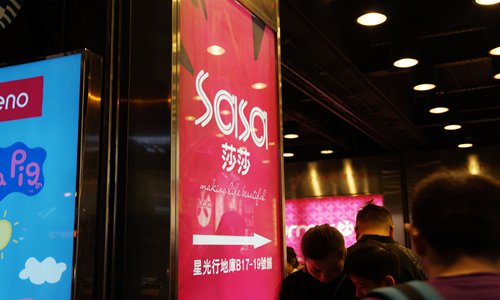HOME >> BUSINESS
Pro-riot companies draw rising fire, leading to boycotts among mainland consumers
By Xie Jun Source:Global Times Published: 2019/9/5 20:58:40
Backlash in mainland may lead to boycotts

A Sa Sa store logo in Hong Kong Photo: IC
Companies that are suspected of supporting radical Hong Kong protesters are facing a strong backlash in the form of declining stock prices and continued boycotts launched by mainland internet users.
A recent example is Sa Sa, a Hong Kong-based retail cosmetics giant popular with Chinese mainland tourists. The company's shares sank on Thursday after it was suspected by mainland internet users of supporting secessionist forces in Hong Kong. Its shares fell 7.89 percent to HK$1.75 ($0.2233) at Thursday's closing.
"Pro-riots choice should be a very important reason for the stock price plunge, as investors worry that pro-riots stance will have a severe impact on its business performance," Xi Junyang, an economics professor at the Shanghai University of Finance and Economics, told the Global Times on Thursday.
In particular, investors worry that the crisis would lead to a boycott of Sa Sa by mainland consumers, who are normally a major income source for the company, Xi said.
The daughter of Sa Sa's chairman is married to the son of Hong Kong barrister Martin Lee Chu-ming, who has been criticized for using "freedom" and "democracy" as a cover to mobilize young students for illegal rallies and violent protests. An employee of the company's public relations department, surnamed Tang, told the Global Times on Wednesday the company does not stand with Lee and has never supported his political views, despite the marital ties.
Hong Kong's Hang Seng Index has dived from 28,371 points on July 22 to 26,515 points on Thursday, as riots persist in the city.
Besides stock price plunges, companies accused of supporting Hong Kong protests continue to face boycotts from mainland customers.
For example, mainland netizens have recently launched a boycott against Cousin Restaurant. The Hong Kong-based tea restaurant was opened by Hong Kong film director Alfred Cheung Kin-ting, who has been accused of showing a pro-riot stance.
In a post in the Dazhongdianping app commenting on the restaurant's branch in Zhuhai, South China's Guangdong Province, one netizen asked: "Would I be driven out of the restaurant if I support Hong Kong police?"
Cousin Restaurant issued a WeChat statement saying that it supports the "one country, two systems" policy.
Taiwan-based beverage retailer Yifang Fruit tea has encountered a similar crisis. The company faced a boycott from mainland internet users after it was suspected of supporting secessionist forces in Hong Kong, with images circulating on Sina Weibo showing a notice at one of its Hong Kong branches reading like a pro-riot slogan.
A 20-year-old mainland student named Gu Zhiran told the Global Times on Thursday that if she knows of any restaurants whose managers have made comments to support Hong Kong riots, she wouldn't step into those places again.
"I don't want to help those people who support splitting China to make money in the Chinese mainland," she said.
Wang Sixin, a media law professor at the Communication University of China in Beijing, said that there's no room for an ambiguous stance on the Hong Kong issue.
"It's immoral and abominable if companies are opportunistic about their political stance but at the same time want to take advantage of mainland market opportunities," he told the Global Times on Thursday.
Wang also said that he supports the netizens' boycott of questionable companies. "It's a correct thing the netizens have done to compel those companies to have a clear mind. We shouldn't just let matters drift," he commented.
Newspaper headline: Pro-riot companies draw rising fire
Posted in: COMPANIES,BIZ FOCUS